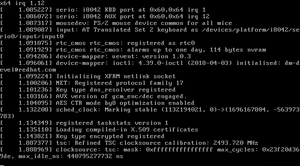Linux kernels

Tux the penguin, mascot of Linux
|
|

Linux kernel 3.0.0 booting
|
|
| Developer | Linus Torvalds and thousands of collaborators |
|---|---|
| Written in | C and assembly |
| OS family | Unix-like |
| Initial release | 0.01 (17 September 1991) |
| Latest release | 4.12.2 (15 July 2017) |
| Latest preview | 4.13-rc1 (15 July 2017) |
| Available in | English |
| Kernel type | Monolithic |
| License | GNU General Public License, version 2 plus various optional freely redistributable (proprietary) binary blobs |
| Official website | kernel |
The Linux kernel is a monolithic Unix-like computer operating system kernel. The Linux family of operating systems is based on this kernel and deployed on both traditional computer systems such as personal computers and servers, usually in the form of Linux distributions, and on various embedded devices such as routers, wireless access points, PBXes, set-top boxes, FTA receivers, smart TVs, PVRs, and NAS appliances. The Android operating system for tablet computers, smartphones, and smartwatches uses services provided by the Linux kernel to enable its functionality. While the adoption on desktop computers is low, Linux-based operating systems dominate nearly every other segment of computing, from mobile devices to mainframes. As of November 2016[update], all but two of the world's 500 most powerful supercomputers run Linux (the other two run AIX, a proprietary Unix operating system on IBM POWER7 hardware).
...
Wikipedia
